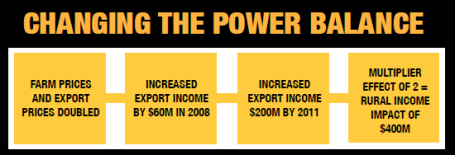GUERRILLA IP
Terrorist group as production site of intellectual capital

Gold foil, black faux-leather hardback, “a visual statement that suggests this book sees itself as an important tome.” It’s the work of a former UN counter-terrorism analyst and a creative director with outfits like Gucci and Prada.
The question is: does cultural branding matter here? Is contradiction the chief leverage here as it is with say Snapple or Corrona? Is Doug Holt correct? I suspect this is too tall of an order for a design book (and the design-centric gaze), but those are the questions.
RAISING THE FLOOR
Corporate tax reform and minimum wage raises go together

Hundreds gathered in Seattle’s Labor Temple. The occasion: a rally to kick off the launch of 15Now.org, a grassroots organization dedicated to raising Seattle’s minimum wage. Kshama Sawant’s successful campaign was centered around a 15$/hr minimum wage, and the idea has been endorsed by Mayor Ed Murray, as well as Working Washington, the organization behind SeaTac’s historic 15$ minimum wage initiative.
But minimum wage was not the only issue on the table. Corporate tax reform, such as the Stop Tax Haven Abuse Act legislation introduced by Sen. Carl Levin (D-MI) would raise $220 billion dollars of US revenue over the next ten years, stop tax subsidies for exporting jobs overseas, force corporations to pay their fair share of taxes, and help to level the playing field between corporations and small businesses, allowing small businesses to create good jobs.
 Washington CAN!, the state’s biggest grassroots organization, emphasized the need to insert tax reform into the living wage debate.
Washington CAN!, the state’s biggest grassroots organization, emphasized the need to insert tax reform into the living wage debate.
“As the living wage conversation heats up in Seattle, we must also keep in mind efforts to curb income inequality at the top. Legislation like the Levin Bill would hold multi-national corporations accountable for their full share of tax contributions, and would provide the resources needed to kick-start the economy and ease legislation focused on austerity” said Washington CAN! organizer Chris Genese.
Filing deadline for a $15/hr referendum that bypasses the City Council and puts the decision directly in front of Seattleites is late March.
DREAMS OF ALIGNMENT
Ethiopia sets to prove F. Scott Fitzgerald wrong, again
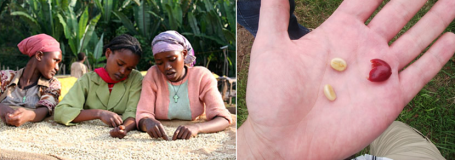
They got drunk on their own success, some would say, but that sentiment misses the point. Ethiopia’s fine coffee brand ownership and management labors have always been about the right to choose its own path whether that meant f*%#ing up or hitting it out of the ballpark. The brawl with Starbucks was predictably intoxicating and predictably both helping and hurting the initiative’s real goals.
All of those goals––trademark ownership of fine coffee brands in all export markets, creation of an umbrella brand, and the ultimate de-linking from New York ‘C’ and tying of wholesale pricing to the movements of the final retail price––all of that depended on one gargantuan task: convincing key distributors and sellers of Ethiopian beans across the globe to sign license agreements and join a network of licensed distributors; in other words, to effectively change the terms of engagement in a business going for at least three centuries. (There is much to argue that Harar, Sidamo and Yirgacheffe are among the modernity’s birthpang brands, which of course gives this fast-developing story a strong tinge of meta.)
That tale another time.
That in the course of all this work Starbucks (as well as some European and Japanese companies) turned out to already own some of the sought trademarks was at first helpful as it raised the initiative’s profile. Lawfare would have left Ethiopia run over on the roadside with hardly anybody noticing, so it took to convincing a reluctant Oxfam (again, development folks usually don’t know what to do when poor producers want to play First World games on First World turf) to front for it. The Mermaid was eventually cornered. But considering that Sbux buys about 2% of Ethiopia’s annual output, the real work was still barely scratched.
What a difference a day [two years] made. In all of this hoopla, Specialty Coffee Association of America (SCAA) traveled from opposition into neutrality and then into full (well, it comes and goes) embrace of Ethiopia and, at the tail end of Sbux finally agreeing to a licensed use of Ethiopia’s IP, it let it put on a colorful show as Africa’s first “2008 Portrait Country” in what is considered to be the world’s biggest coffee tradeshow, SCAA’s annual 10,000+ strong conference and exhibition.
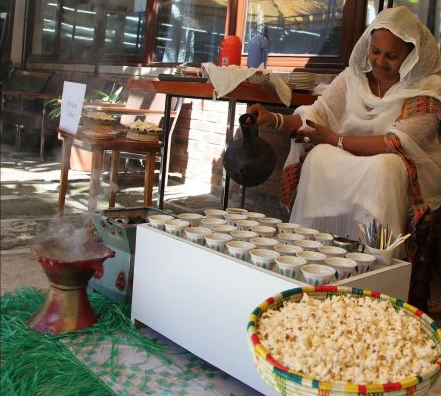
Key in all of this were the early licensees, small Fair Trade importers and boutique roasters who backed the Ethiopian effort thru Sbux PR/lawfare and politicked within SCAA to turn it around as the power of these gourmet players within trade bodies has grown with the sophistication and segmentation of the specialty coffee market.
Now it was time for Ethiopians to do scale and face prospects of dealing with a network of licensees that included small gourmet-istas as well the Big Coffee, such as Proctor & Gamble and Kraft, lefty-ish giants such as Whole Foods, and old-school, old-colonial, invisible Swiss and German family companies, middle-men (who buy and resell probably all of the coffee you have tasted since you’ve been drinking it), and everybody in between.
Even if all this had been something undertaken by a Western corporation and not by one of the world’s poorest countries, it would take all they got. Ethiopians got busy producing promo videos, raising money, signing agreements, keeping the complex home turf of cooperatives and exporter groups as united as possible, and fine-tuning the umbrella brand and introducing brand guidelines (adherence to which is the sole ask of the royalty-free license agreement), all unveiled at their SCAA red carpet moment. They got themselves a brand agency, the London-based Brandhouse.

According to supporters, such as Light Years IP, major work is ahead but also some preliminary results are claimed:
Changing the negotiating position of Ethiopian coffee farmers has held long-term benefits. Rather than all of the value being captured by 5–6 German companies, the Ethiopian coffee farmers changed the power balance.
Income improved for Ethiopian fine coffee farmers by $US 200M since June, 2007. When we add to this, a rural multiplier effect found by the World Bank to be approximately 2.0–2.5, the income return looks like this between 2008–2011.
The extra income has improved livelihoods and prospects for around 1 million Ethiopian fine coffee farmers and small traders. Also, since export prices are now based on retail values for distinctive fine coffees, not the world export/import market for commodity coffee, much greater stability in prices will be achieved in the medium term, providing farming families with the ability to plan their future.
What’s ahead? Joint promotions, indeed, in early 2012; expansion of the now 110-companies strong licensee network; trademark registrations of the umbrella brand; and two goals that seem as tricky as they are ambitious. One is dealing with Africa’s first-ever commodity exchange, ECX, based in Addis Ababa.
Speaking of the Ethiopian Commodity Exchange (ECX), take a look at it and get to know Eleni Gabre-Madhin:
Ethiopia’s fine coffees are now traded on ECX, which claims to translate price premiums to farmer incomes more directly, “meaning that supply responses from farmers are gradually increasing.”
Each promotion in markets will be designed to match supply forecasts, to the benefit of farmers, cooperatives and the licensed importers and distributors in market countries.
And then the envisioned crescendo of all this activity:
Ethiopia has decided to create a modern corporation to manage the brands, promotions and the network of distributors for the long term benefit of farmers, exporter and distributors. The corporation will be built on the lines of the famous and highly successful Ethiopian Airlines, starting in 2011 with top Ethiopian business people on the formation board. International support to this corporation will be through contracts with world class brand managers, IP specialists, experts in network management…

Continue reading IP Colony: A Short Story
THE NITTY GRITTY
Weak (could) become heroes
It’s time to define what an IP colony really is. It is unlike an 18th or 19th century state-private venture, something ala East India Company, that goes after a raw material, a luxury spice, or human labor while relying on its home country (the empire) to provide physical and political control that makes all that possible.
A 21st century IP colonist is still a Western company going after resources in what is now referred to as the developing world and selling products in Western retail. These resources today, in what is the crux of the story you are reading, are intangibles. Obtained through dispossession or crass exploitation or both, it is the intangibles of Global South that underwrite the specialty status and retail value of a great range of corporate, Western products.
Fiji in the story of Fiji Water plays the role of an IP colony.
IP colonists search for and build into their business models distinctiveness in various forms – uniqueness, identity, traditional knowledge, heritage, invention – in order to earn comparative advantage in Western markets where, as elaborated earlier, intangible value makes up most of the price consumers pay for most of the products they buy these days. In practically all instances of IP colonialism, the true and rightful owners of these intangible assets earn sometimes as low as 2%, rarely as high as 10% of income their IP earns in retail. They more often than not live in extreme poverty, on less than $2/day and struggle for physical survival.
In some cases IP colonists manage to outright own this intangible value in retail markets in the of form intellectual property such as trademarks, patents, and trade secrets, in others they use strategies such as distribution monopoly and marketing muscle, to exercise de facto ownership.

But, as I labor to emphasize throughout the story, Fiji water’s is as much a saga of potential and breakthrough as it is of exploitation. The business proposition that makes Fiji Water possible is indeed the hallmark of a world remade by three or so decades of what has come to be known as neoliberalism. The key transformation of this time, our recent past, is appropriately captured in the retail price breakdown for a product such as a bottle of Fiji Water.
Continue reading An IP Colony: A Short Story…
Das Brand
Exploitation 2.0
If I still have you with me, by now you are probably comfortable with murkiness. As another husband-wife duo, not the Resnicks but the Comaroffs, John and Jean, says:
Ethno-commodity is a very strange thing indeed. Flying in the face of many conventional assumptions about price and value, its very appeal lies in the fact it seems to resist ordinary economic rationality.
Ethnicity, Inc. is indeed a strange little pamphlet. One shall dive into it on other occasions. Let’s pick up where we left off with Fiji. Good place would be to again raise a good question:
If a company’s intangible assets are taken into account during its appraisal, why shouldn’t the same be done when considering local partnerships? Precisely because those intangibles have a lot to do with their local partners.
 IP colonist’s deed, you see, is a refined affair, kind of like a white collar crime. It’s clear what happens to you if are caught with a minor possession of drugs, less so if you dabble in derivatives.
IP colonist’s deed, you see, is a refined affair, kind of like a white collar crime. It’s clear what happens to you if are caught with a minor possession of drugs, less so if you dabble in derivatives.
Even the First World startup dreamer understands that outsourcing her manufacturing to an Indonesian supplier who rules their industrial zones like Turkish jails is her part of the Faustian bargain with the Dark Side. She can go elsewhere and probably encounter the same situation (if she wants to learn too much, that is) and also know that her former supplier already replaced her orders with someone else’s.
She will spend her life making sure that anyone and anything showered with her affection does not get anywhere close to it. But to change what troubles the conscious would require a kumbaya suspension of reality, changing the world and all that. It’s business, hunny bunny, and this is how it’s done. Her crime is just one of modernity’s side effects; like, say, her son’s depression. Leave the meditation on those items for other people’s grad school papers and silly degrees.
An IP colonist, however, does not have that escape route. Fiji, David Gilmour and the Resnicks, show why.

If Fiji wanted to embark on what China has its sights set on, or Ethiopian fine coffee producers are struggling to put together, it would stumble upon its intangibles already half seized.
Fiji, the brand, has already been taken. It’s owned and managed by a Los Angeles couple. Fiji is, of course, no Sweden, a motherboard and a country-brand with many global ingredient brands. But it doesn’t even have the option to tread on that path. It’s a country in service of one private brand.

IP colonist is nothing if not thorough. What started out as a trademark application for the phrase “From the islands of FIJI,” without a claim to the word Fiji itself, has slowly gotten even better, even sharper:
Fiji Water … has trademarked the word “FIJI” (in capital letters) in numerous countries. (Some rejected the application, but not the United States.)
Here are the files (pdf), and one more, at the USPTO (U.S. Patent & Trademark Office):
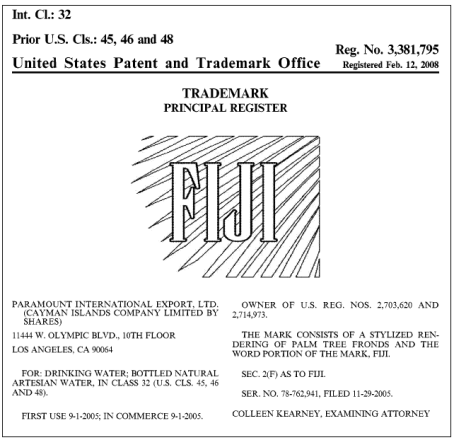
The company got itself regional marketing-channel managers, Fiji’s foreign service:
“Learning from the lessons of products, we must brand ourselves,” Fiji’s ambassador in Washington told a news site for diplomats in 2006, adding that he was working with the Resnicks to try to increase Fiji Water’s US sales. A Fiji Water bottle sits at the top of the embassy’s home page, and the government has even created a Fiji Water postage-stamp series—the $3 stamp features children clutching the trademark bottles.

The ‘bitter-sweetest’ of ironies is Fiji, the country, going after these targets, while the IP colonist sits on top of the page:
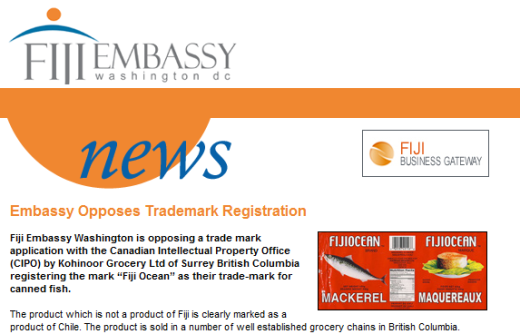
Meanwhile, with savvy worthy of an Interbrand profile and Brandchannel’s accolades, the Resnicks guard aggressively against all threats of dilution. It has gone after:
…rival Fijian bottlers daring to use their country’s name for marketing. “It would have cost too much money for us to fight in court,” says Mohammed Altaaf, the owner of Aqua Pacific water, which ended up taking the word “Fiji” out of its name.
Actually, with threats of lawfare, others are muscled into limiting association with Fiji to small print on the back of products, specifically to prohibit the association to act as a shelf-talker.
For instance, read this short little news item. The last sentence is interesting:
In the suit, which was scheduled to go to trial June 24, Island Chill owner Jay Prakash Dayal asked a federal judge to determine that the company is not infringing on Fiji Water’s trademark by advertising its water as being from Fiji and that the company is not engaging in unfair business practices.
But the companies settled, and Island Chill agreed to remove the flower from the bottles label, and only reference the waters source, Fiji, on the back of the label.
The idea behind settlement was to stop war between the companies and let everybody continue to compete fairly and sell water, said Marc Hankin, Island Chills lawyer.
Island Chill told the Fiji Times the change in trademark is only for its US market.
But it’s not just about the nuts and bolts of formal IP ownership. There is other intellectual capital, too. If they get a call from Resnicks, their liaisons or lawyers, Western retail chains, say 7-11, will run from any distribution agreement with a small untested Fiji producer, be it water, soda, chips, or face lotion, if it smells like complication and unnecessary trouble.
Pretty nice partnership, from the company’s perspective, wouldn’t you say?
Fiji got 300 jobs. Which is good. For people working those jobs, phenomenal.
To think this is anything close to appropriate – considering what local partners brought to the table, a motherboard of intangibles – would require local partners to not know their Rubies in the Orchard.
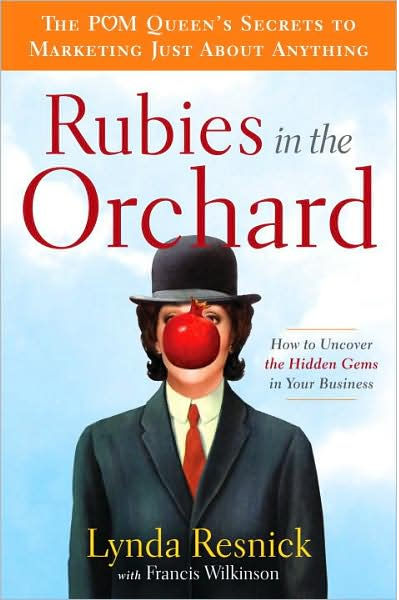
And that’s exactly how IP colonialism works.
There is one source of headache for the company that usually gets talked about when it gets bad press: the supreme irony of Fiji Water bottles in every U.S. supermarket while people around the company’s water plant, and Fiji in general, have no clean, safe water supply. Hence:
[T]he company created the Vatukaloko Trust Fund, a charity targeting several villages surrounding its plant. It won’t say how much it has given to the trust, but court proceedings indicate that it has agreed to donate 0.15% of its Fijian operation’s net revenues; a company official testified that the total was about $100,000 in 2007.
Notice that this not the Sbux brand-equity-compassion machine where this is directly being written into brand architecture. Fiji Water has no plans to scream on a bullhorn how wonderful it is. (Remember, it’s a people-free brand.) This is strictly to keep things orderly around the plant. Just for comparison sake: in 2008, Fiji Water’s marketing budget alone was at $10 million (Brandweek). When it likes something, it goes for it:
It recently dropped $250,000 to become a founding partner of the new Salt Lake City soccer stadium.
But perhaps the height of the you-should-not-know-your-rubies-in-the-orchard moment came late last year. The audacity of such a bluff can only happen when you think the other side is so clueless that you can say anything. Here is how the story came on your favorite channel:
Fiji Water reopened its operations in the South Pacific nation of Fiji on Wednesday – just two days after closing its bottling plant and laying off 400 workers in a row over a major government tax increase.
The U.S.-owned company said after meeting with Fiji’s leaders it has agreed to “comply” with the hefty tax hike imposed on it by Fiji’s military-led regime.
The prime minister, Commodore Frank Bainimarama, said earlier he was ready to call tenders from international groups interested in taking over the artesian water bores that Fiji Water uses to extract one of the world’s most popular bottled water brands.
On Monday the company, owned by California entrepreneurs Lynda and Stewart Resnick, said it was closing its facility in Fiji, canceling orders from suppliers and putting on hold several construction contracts in the country.
After its lawyers met Tuesday with Bainimarama and Fiji’s Attorney General, Aiyaz Sayed Khaiyum, the company said it a short statement that “Fiji Water will reopen its bottling plant, effective Wednesday morning, Dec. 1, at its regular start up time of 8 a.m. Through our discussions, we have also agreed to comply with Fiji’s new water tax law.”
Since the company’s beginning with David Gilmour in 1995, it has enjoyed a tax-free status. From a friendly military junta he got both the 99-years on the land and tax free-status that at the time was justified because, Mr. Gilmour claimed, the whole project was a risky business proposition and Fiji had nothing to lose, only to gain. Once cornered to pay, after almost 15 years of tax-free status, Fiji Water threatened to leave. It let rumors spread that it was considering New Zealand as its new home.
An old-school colonist would have probably done that. Labor is labor. An IP colonist has a bit harder time separating from assets that underwrite her retail value. Continue reading IP Colony: A Short Story
MAN’S HONOR
On arguing in the master’s language

I always thought The Most Interesting Man in the World was Euro RSCG’s (one of the world’s largest mental real estate agencies) deliverable to its client Dos Equis. And that the agency’s rationale went something like:
He is a man rich in stories and experiences, much the way the audience hopes to be in the future. Rather than an embodiment of the brand, The Most Interesting Man is a voluntary brand spokesperson: he and Dos Equis share a point of view on life that it should be lived interestingly.
And that he challenged across categories and dueled across social media with Isaiah Mustafa’s manly purr, a former NFL wide receiver who switched to “playing defense for Old Spice against the Dove launch.”

There is a debate why The Man Your Man Could Smell Like supposedly never managed to move sales the way The Most Interesting Man did. Nivea did just as well without the purr, and Dos Equis helped more friends stay thirsty. At least that’s the word on the street.
What I never knew, however, is that The Most Interesting Man actually lived. And that he resembled Mustafa a bit more than Jonathan Goldsmith.
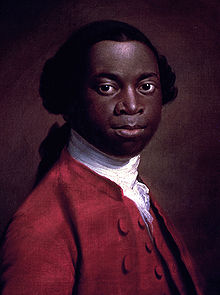
The world’s Most Interesting Man is a man who survived the Middle Passages. His name was Oladuah Equiano. He was born sometime around 1745 in a rural community somewhere within the confines of the Kingdom of Benin. At the tender age of eleven Equiano was kidnapped from his home and eventually sold to British slavers operating in the Bight of Biafra.
From whence he was conveyed first to Barbados.
Then to a plantation in colonial Virginia.
After spending much of the Seven Years’ War hauling gunpowder for the British frigate, he was promised his freedom, denied his freedom, sold to several owners – who regularly lied to him, promising his freedom, and then broke their word – until he passed into the hands of a Quaker merchant in Pennsylvania, who eventually allowed him to purchase his freedom.
Over the course of his later years he was to become a successful merchant in his own right, a best-selling author, an Arctic explorer, and eventually, one of the leading voices of English Abolitionism. His eloquence and the power of his life story played significant parts in the movement that led to the British abolition of the slave trade in 1807.
Equiano’s further adventures – and there were many – are narrated in his autobiography, The Interesting Narrative of the Life of Olaudiah Equiano: or, Gustavus Vassa, the African, published in 1789.
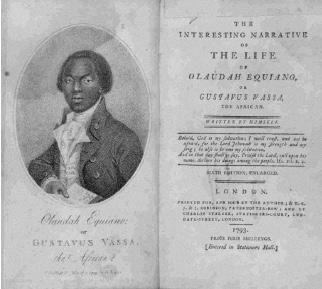
Readers of Equiano’s book are often troubled by once aspect of the story: that for most of his early life, he was not opposed to the institution of slavery. At one point, while saving money to buy his freedom, he even briefly took a job that involved purchasing slaves in Africa. Equiano only came around to an abolitionist position after converting to Methodism and falling in with religious activists against the trade. Surely, if anyone had reason to understand the evils of slavery, he did.
The answer seems, oddly, to lie in the man’s very integrity. One thing that comes through strikingly in the book is that this was not only a man of endless resourcefulness and determination, but above all, a man of honor. Yet this created a terrible dilemma. To be made a slave is to be stripped of any possible honor. Equiano wished above all else to regain what had been taken from him. The problem is that honor is, by definition, something that exists in the eyes of others. To be able to recover it, then, a slave must necessarily adopt the rules and standards of the society that surrounds him, and this means that, in practice at least, he cannot possibly reject the institutions that deprived him of his honor in the first place.
It strikes me that this experience – of only being able to restore one’s lost honor, to regain this ability to act with integrity by acting in accord with the terms of a system that one knows, through deeply traumatic personal experience, to be utterly unjust – is itself one of the most profoundly violent aspects of slavery. It is another example, perhaps, of the need to argue in the master’s language…*
Defending your humanity in front of the Master is always an exercise in Creole dialect of economese and legalese.
Let’s leave you with The Most Interesting Man’s 16 sec advice on your career:
——-
*These passages are borrowed with no sense of debt from David Graeber’s Debt: The First 5000 Years.
DON’T LET THEM CALL YOU SKINNY
The past is a foreign country
And when it comes back to you, it has all the markings of an Onion headline. Via Retronaut, a tour through the annals of marketing:



SAINT PATRON OF THIEVES
Anonymous gifts/thefts create no debts
Holidays upon us and always a good time to remind that Santa Claus, or Saint Nicholas, is not just a patron saint of children but also patron saint of thieves.
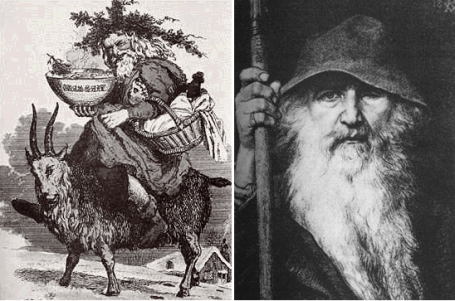
He also looks out for prostitutes and pawnbrokers.
ŽIŽEK: A BRAND ARCHITECTURE
A ________ company. Meta-Games-Without-Borders.
Slavoj Žižek is fascinated with intellectual property. He admits that his arsenal lacks good approaches to dealing with it. He often warns fellow Lefties that classicist Marxian exploitation does not explain Bill Gates. Going further than that has been hard.

Insights could be gained via brand extension. Slovenian’s own brand could venture into categories beyond publishing and public speaking industries. Mind-share and heart-share equity (hard earned with years of fighting word processors, agents, back pain, family and state institutions) could be leveraged into accessories, clothing, beverages, or a successful venture across categories.

Lifestyle and market segmentation lend themselves to a unique brand architecture design, with potential for hard-to-pull-off brand stretching.

